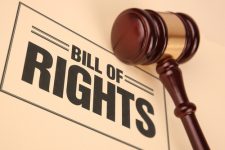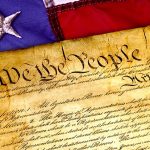It’s Time for an Australian Bill of Rights

After the second world war, a series of international treaties began being introduced via the United Nations in order to define and protect people’s “inalienable human rights.” Australia has ratified the seven core international human rights conventions.
This means that at the international level, the Australian government has committed to uphold these values and its citizens are supposed to have their human rights protected. However, Australia’s track record is not consistent with its signing of these instruments.
The United States has a bill of rights embedded in its constitution. The bill was established to create greater constitutional protection for the fundamental rights and freedoms of US citizens, while restricting the powers of the state.
At present, Australia is the only democratic western nation not to have a bill guaranteeing its citizens rights under the law. For decades now, there’s been a persistent national dialogue outlining the need for such a bill and calling for its establishment.
But this has largely been ignored by the major political parties.
Indeed, the Chief Justice of New South Wales, Tom Bathurst, recently counted 397 encroachments by the government on three ‘rights’ alone – the presumption of innocence, the right against self-incrimination and client legal privilege. And that’s just the tip of the iceberg, with successive governments passing legislation which removes our legal safeguards and protections right under our noses, with little public consultation and bipartisan political support.
The Australian Constitution
In the 1890s, there was debate amongst lawmakers drafting the Australian Constitution as to whether a bill of rights should be included. A vote was cast and the proposal lost 19 votes to 23.
There was fear amongst those involved that a bill of rights may undermine certain discriminatory provisions that were found in the law at the time. These included laws and practices that disadvantaged Aboriginal people and the Chinese living in Australia.
As it turns out, there are currently only a few rights protected by the Australian Constitution.
Section 41 outlines that citizens have the right to vote. Section 51 (xxxi) provides that a person has the right to fair compensation if the government acquires their property. Section 80 protects the right to a trial by jury, while section 116 protects freedom of religion. The High Court has also found that a right to freedom of political communication is implied in the constitution.
The fact that these rights being enshrined does not mean they are afforded to every citizen. Take for example the right to vote. There are restrictions placed on certain prison inmates that prevents them from being able to vote in elections.
The two forms a bill of rights can take
There are two ways an Australian bill of rights could be legislated – either constitutionally or via ordinary statute law.
A constitutional bill of rights allows judges to invalidate laws that are at odds with human rights. These are laws that have been enacted by parliament. However, it’s a difficult process to make amendments to the constitution. And once they’ve been made, they’re almost impossible to change.
Indeed, the US bill of rights is made up of amendments to their constitution. An argument against the constitutional model is that the US bill establishes the right to bear arms. And today, with all the gun violence in the States, many believe this right to be problematic and out of date.
Then there’s the statutory model of a bill of rights. This would not necessarily allow for judges to invalidate new laws. But it would allow for the federal parliament to make amendments to the bill of rights itself. The human rights outlined in a statutory bill are therefore not as secure.
New Zealand has a statutory bill of rights. It was enacted in 1990. However, the New Zealand bill doesn’t actually allow an individual to bring legal action against the government if a law breaches a right.
Council for Civil Liberties
Stephen Blanks, president of the NSW Council for Civil Liberties (NSWCCL), has been advocating for an Australian bill of rights for years now.
Mr Blanks favours a constitutional model, “because then it does achieve the objective of making it difficult for parliament to pass laws that are inconsistent with human rights.” He added that human rights “ought to be bedrock to a free society,” and parliament shouldn’t be able to trade them off “for other political considerations.”
According to Blanks, “one of the problems with the Australian legal system now is that if people’s human rights are infringed’ the only recourse they have is to “make a complaint to the Australian Human Rights Commission (AHRC).”
A constitutional bill of rights would give citizens the right to take legal action when their rights have been infringed upon, Mr Blanks added.
Following the lead of the states
Australian state jurisdictions have begun drafting their own statutory bills of rights in recent years.
The ACT passed the Human Rights Act in 2004, while Victoria passed its Charter of Human Rights and Responsibilities Act in 2006. There’s been talk of Queensland and Western Australia following suit.
“Over the next few years, I think it’s really going to emerge that the Commonwealth will be out of step with community opinion in the states,” Mr Blanks told Sydney Criminal Lawyers®.
The NSWCCL recommends establishing a Human Rights Act at the federal level. This would work as an interim measure before changes to the constitution were made.
This legislation would “restrict parliament’s ability to pass laws that are inconsistent with human rights,” Blanks explained. “Not absolutely. But raise barriers.”
Parliamentary opposition
In September 2009, the federal government’s Human Rights Consultation Committee recommended that a national Human Rights Act be established. However, in April the following year, the Rudd government rejected the idea.
Many believe the reason Australia has never passed a federal human rights bill is that both major parties want to “maximize the power of parliaments, and not have any standards imposed on them,” Blanks explained.
An Australian bill of rights would establish the same rights for all individuals, regardless of their background. This would make it easier for marginalised members of society to seek legal recourse when their rights are infringed.
At the same time, the bill would lessen the power of the government to remove civil liberties.
Deprived us our rights
An example of federal government hypocrisy is that in April 2004, then-prime minister John Howard spoke out in strong support for a bill of rights for the country of Iraq. However, in the past, he’d made it clear he does not support a bill of rights for Australians.
Mr Blanks pointed to former-prime minister Tony Abbott’s recent calls to abolish the AHRC as another example of the government working against domestic human rights. This “would set Australia back 50 years,” he remarked.
“So long as the agenda is driven by people whose interest is primarily power, rather than the public good,” Blanks concluded. “Then it’s very difficult to get a coalition in favour of human rights legislation.”








